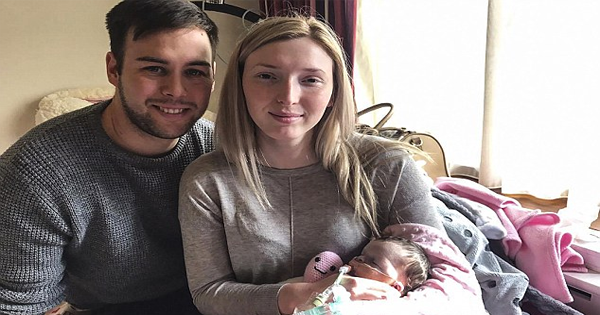Advertisement
When 21-year-old Charlotte Szakacs was just 20 weeks pregnant with her daughter, Evyln, the doctor gave her incredibly devastating news. Evyln had a chromosome abnormality and there was a very small chance of her surviving through the health struggles she would face as a result.
Evyln’s brain wasn’t developing properly and the arch that connected her brain to her heart wasn’t forming properly either. Doctors conducted further tests with Evlyn’s amniotic fluids and discovered that she had unbalanced chromosome translocation, a condition where a child is either missing or has extra genes.
Charlotte can still remember the moment she and her husband, 28-year-old Attila, received the news. “When we got the news after the 20 week scan, Attila and I completely broke down. …at that point we just had no idea what it all meant,” she admitted.
“The last thing you want as a parent is for your child to be sick and even after we were told she would probably never breathe on her own, we still clung onto this tiny bit of hope that she would.”
As the weeks passed, Charlotte went back to the hospital to have scans performed every two weeks to keep track of Evlyn’s health.
During Charlotte’s 37th week of pregnancy, doctors decided Evlyn could no longer remain in the womb because Charlotte’s placenta was beginning to fail and no longer providing Evlyn with an adequate amount of blood to survive.
Evlyn was delivered via C-section and then rushed to be placed in a ventilator. New mother Charlotte wasn’t allowed to see her daughter for another seven hours. She was told she had to wait another three days until she could even hope to hold Evyln.
At birth, Evyln was just 5 lbs, 5 oz. Her brain, as doctors had predicted, was undeveloped and completely smooth, without any of the usual ridges and bumps. Her airways were also too narrow, making it difficult for the girl to even breathe.

But against all the odds that were stacked against her, Evlyn fought for her life.
Doctors advised her parents to put her in a hospice, as they didn’t think the little girl would live for very long, but they weren’t ready. “I didn’t want to believe what they were saying,” Charlotte added.
Over the next week, however, Evlyn’s parents could no longer deny the truth. “She got worse and worse,” Charlotte recalled, “and we knew we could either watch our little girl die in a hospital, on a ventilator, surrounded by doctors and beeping machines or let her go peacefully in a lovely hospice.”
“It was the hardest decision you could make as parents but I knew keeping her at the hospital would just be selfish.”
On January 10, Evlyn and her parents moved to the hospice. It was the first time Charlotte and Attila could hold their daughter and cuddle her properly, without any machines in the way. They had just one hour before nurses came to turn off Evyln’s ventilator.

A couple minutes later, Evlyn passed away in her mother’s arms. Father Attila had his arms around both women.
Then, the hospital offered the family something completely unexpected. Because the family hadn’t had any time together to bond because of Evlyn’s condition, they were offered a “cuddle cot” that was kept refrigerated to preserve Evlyn’s lifeless body.
Even though Evlyn had passed, Charlotte and Attila could take their daughter out for walks in the garden or even cuddle her. “And then we were allowed to take Evlyn and her cuddle cot home for the last four days. Her last night she slept in her actual cot we had got for her in our room,” Charlotte remembered.
16 days after Evlyn passed, the family finally held her funeral for her.
Some are stunned that the Szakacs family would do such a thing, but for Charlotte and Attila, the cold cot “allowed [them] to spend extra time with their daughter after she had died, and some parents [say] that spending time with their babies at home or in the hospital can help them with the grieving process.”
Charlotte is now encouraging any mothers or mother-to-be’s who know they will lose their newborn child to look for these services for support through an incredibly difficult time.




